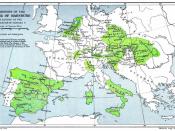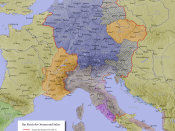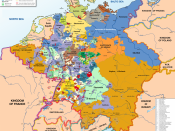An absolute monarch is a king of queen that has unlimited power and seeks to control all aspects of society. There were many leaders that were able to increase their power in one way or another. They were the kings and queens of Western Europe, the Hapsburgs of Austria, and the Hohenzellerns of Prussia.
Rulers across Western Europe wanted to control every aspect of their empire's affairs. These rulers wanted to be absolute monarchs; their goal was to control every aspect of society. Absolute monarchs also believed in the divine right, the idea that God created the monarchy and that the monarch acted as God's representative on earth. An absolute monarch answered not to his or her subjects, but only to God. The serfs in Western Europe during the late Middle Ages gradually won their independence and moved to towns. They then joined the middle class townspeople, who gained the economic power because of the development of capitalism and the Commercial Revolution.
The middle class believed in absolute monarchy, because absolute monarchs promised a supportive, peaceful climate for business. No longer were governments the sole owners of great wealth. Due to overseas colonization and trade, numerous merchants had obtained great wealth. Monarchs used the wealth of their colonies to pay for their ambitions. As a result, businesses across Europe grew and flourished.
The Hapsburgs of Austria remained the most powerful and important state within the Holy Roman Empire, even after the terrible losses in the Thirty Years' War. These Austrian rulers took four steps to become more powerful. First, they reconquered Bohemia during the Thirty Years' War. In Bohemia, the Hapsburgs wiped out Protestantism and formed a new Czech nobility that pledged devotion to them. Next, the Hapsburg ruler created a standing army and centralized government after the war.



Did you forget about Democracy in the Middle Ages?
Democracy has been around since 438 BCE. WHy not mention what happened to these places? WHy bash and bash Monarchy? Being anti Monarchy is being anti-God. God is a Monarch. His system of government has been Monarchy since time began. The perfect form of government is a Constitutional Monarchy plain and simple since Democracy came through a Monarchy you cannot argue with that either.
1 out of 2 people found this comment useful.